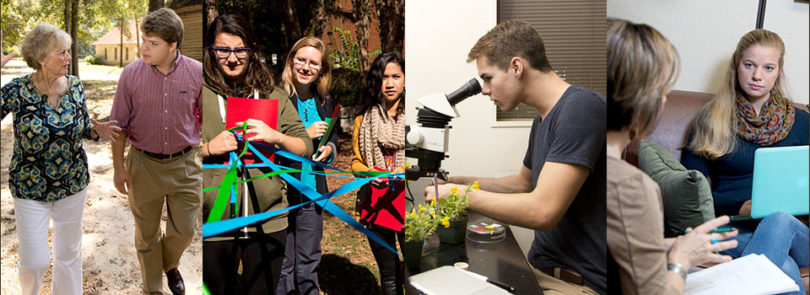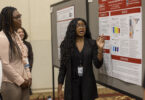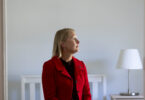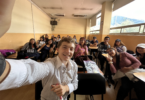When Austin Garner leaves UGA in May he’ll have completed a research project in genetics and have presented his work at several regional and national scholarly conferences. In addition to his degree, he’ll take with him the confidence he developed in running his own research project and working alongside UGA’s team of geneticists.
Not bad for an undergraduate.
“I’ve learned so much about who I am as a person, who I am as a scientist. It really changes how you think about things,” says Garner, who is majoring in genetics and hopes to pursue graduate degrees in evolutionary ecology.
Garner is taking advantage of CURO, the Center for Undergraduate Research Opportunities, which allows students to work alongside UGA’s top faculty members on research projects often afforded only to students in graduate programs. The CURO program began as an opportunity for students in the Honors Program, but since 2010 has officially been offered to all undergraduate students, across all majors and disciplines.
CURO is one of several initiatives at UGA that works to better engage undergraduate students earlier in their college careers to improve retention and graduation rates. In addition:
- In 2011, UGA rolled out its First-Year Odyssey Program, which provides small-class seminars (15 students per class) with tenured or tenure-track professors for all first-year students. Students must complete a one-hour Odyssey course before the first semester of their second year.
- Since 2001, UGA has offered the Freshman College Summer Experience, which brings admitted students to campus for a month-long residential experience before the start of their freshman year. Students earn six hours of academic credit and participate in programs and events that introduce them to the diverse resources available at UGA.
- Since 1997, UGA has worked to extend opportunities for international study for all students, either through month-long Maymester programs or more traditional semester abroad programs.
In the past decade, UGA’s four-year and six-year graduation rates have increased significantly and administrators credit programs like these with the difference.
“We are very serious about our students’ academic experience,” said David Williams, associate provost and director of UGA’s Honors Program. “By providing high-impact experiences such as undergraduate research, faculty mentoring and study abroad, we can ensure that they have every opportunity to succeed.”
Garner’s introduction to undergraduate research was through Andrea Sweigart, an assistant professor of genetics, who he met following a panel discussion on science research opportunities. Sweigart was impressed by Garner’s interest in her work-how species evolve to become reproductively isolated-and offered him an opportunity to assist in her lab.
Sweigart encouraged Garner to apply for a CURO summer fellowship, which would provide him a stipend to stay on campus and continue his research. And she set him on course to look at an area that she had not gotten to, measuring the strength of hybrid lethality as a reproductive barrier between two subspecies of Mimulus, a wildflower that grows primarily in the Western United States.
“He’s doing at this point essentially graduate-level work,” says Sweigart, who has since taken on another CURO student. “It helps them (realize) they’re doing something that is really valued.”
—•—
It’s a beautiful fall day and Sonia Altizer has her First-Year Odyssey class outside the classroom in the garden next to the ecology building. The seminar, “Hidden arms race: Rapid evolution of pathogens in a changing world,” is on infectious disease and today the students are learning how pathogens can spread through networks of populations.
Altizer, an associate professor of ecology and associate dean of academic affairs for the Odum School of Ecology, has her students stand in a circle. The person on either side of you is in your network, and you pass your infections on to them, she tells them. “Each of you has two and only two contacts,” she says.
Using colored streamers and construction paper she then connects the students to others in the group, forming a colorful web design in their circle. In this scenario, some of the students will have only a few contacts while others will have a lot of connections. These are “super spreaders,” she says.
Now she introduces the vaccine.
“If you only had enough vaccine for 20 percent of the population, you’d want to give it to the super spreaders,” she says. “Who would you choose?”
Students suggest heavy travelers, children in school populations, health-care practitioners.
“That might be the rationale for the way vaccinations are given out in real life,” Altizer says.
One of the students from Altizer’s Odyssey course is working in her lab this spring. Selin Odman, a freshman from Johns Creek, came into UGA with plans to pursue a medical degree. However, learning about opportunities to explore infectious disease from a research perspective caught her interest.
“I saw how it affects lives and how it infects the environment,” said Odman.
Odman said she didn’t think she would have the qualifications to work in a lab with a UGA faculty member so early. But the opportunities at UGA, like being in a class led by a tenured professor, gave her confidence, she said.
“You start doing things you didn’t think you could do,” she said. “You see your real potential.”
Altizer has hired two freshmen to work in her lab since 2007. Prior to that, the undergraduates she worked with were juniors or seniors.
“The nice thing about doing research earlier is it gives them time to experience things and do independent projects,” Altizer said. “Both (previous freshman assistants) turned their projects into Honors theses.”
According to the Association of American Colleges & Universities, first-year seminars, undergraduate research, writing-intensive courses, diversity and service-learning programs are among ways to improve undergraduate retention and graduation rates.
Since 1999, UGA’s six-year graduation rate has climbed from 75.8 percent to 83.3 percent (for the freshman class of 2005, the last year records are available).
Programs like CURO and First-Year Odyssey also can be a draw for students who are looking for opportunities to do research but don’t want to go to a private school or a smaller institution, where opportunities might be greater.
Seth Euster, a sophomore from Dunwoody, was one of those. During an Honors Program history course in his first semester at UGA, Euster began doing research on the history of slavery at the Shields Ethridge farm in Jefferson. Once the class ended, he continued working on the project through CURO. He is working with Christopher Lawton, a Digital Humanities Fellow in the Willson Center for Humanities and Arts, to include his research in the Georgia Virtual History Project, which Lawton co-founded and directs. The project uses new and interactive technologies to record the history of the state of Georgia and make it available to the public.
Euster also has been invited to participate in a panel discussion for the spring meeting of the Georgia Association of Historians.
While he considered other schools, such as Emory and Tulane universities, Euster said the opportunity to do his own research as an undergraduate was the selling point for UGA.
“It puts me leagues ahead in so many areas,” he said. “I wouldn’t be doing anything like this in any of the other programs I was looking at.”
—•—
Ratchet is the word for the day in Bettina Love’s First-Year Odyssey seminar, “Exploring the History of Hip-Hop and Why It Matters.”
“What is ratchet?” asks Love, an assistant professor of educational theory and practice in the College of Education. “Have you called somebody ratchet in the last 24 hours?”
They’re talking about a new song by Beyoncé, the lyrics of which seem to contradict Beyoncé’s high-class personality. Ratchet, according to the New Urban Dictionary, means a diva from urban cities and ghettoes that incorrectly thinks she is “every man’s eye candy.”
On the screen is a picture of Beyoncé, wearing a Houston Rockets cap turned to the side, and large hoop earrings. The song playing is “Bow Down,” with uncharacteristically tough, foul lyrics about her hometown of Houston.
“It demands respect from a feminist point of view,” Love says of the song.
Over the 16-week fall semester, students in Love’s seminar-a mix of males, females, whites and minorities-will use the culture and history of hip-hop to talk about politics, racism, sexism, cultural differences and music. One class centered on whether influential African-Americans have a responsibility to speak up on social issues, such as the Trayvon Martin shooting.
Claire Childers, a first-year student from Perry, says Love has forced students in the class to think about things differently.
“She helps you speak up so that your opinions are at least heard,” Childers says. “It’s taught me to speak up and it’s given me a new respect for the hip-hop culture.”
Many students often stay after class to show Love a new hip-hop video on YouTube or to continue the class discussion.
While the music may be the draw, Love says the course is preparing the young students for the rest of their college careers.
“I’m trying to get them to be critical thinkers,” she says. “We can use hip-hop to have an intelligent conversation. They can take that critical lens and apply it to their (other) classes.”








